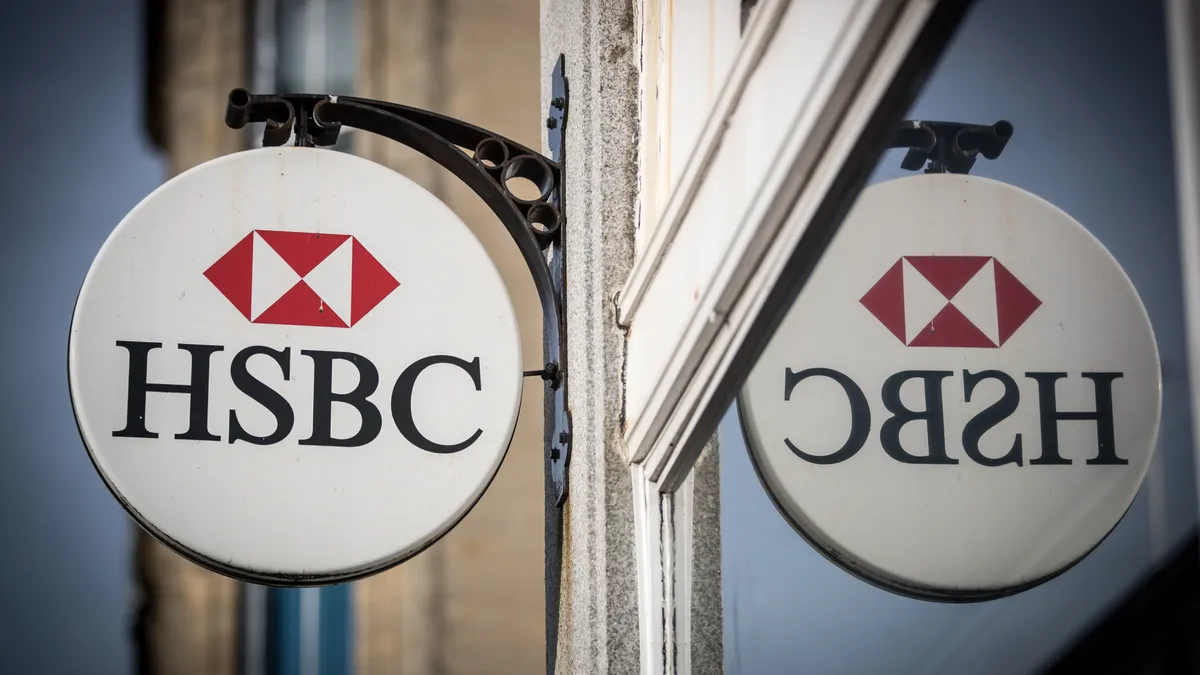Dive Brief:
- HSBC is pushing back a target to achieve net-zero emissions across its own operations and supply chains by 2030, according to the bank’s annual report released Wednesday. HSBC said it is on track to achieve a 40% reduction in emissions for these metrics by the end of the decade.
- The U.K.-based bank — the largest in Europe, based on market capitalization, assets, and revenue — said it had “revisited [its] ambition” and is delaying its goal of hitting net-zero in its operations, business travel and supply chain by 20 years, to 2050.
- HSBC also said it has initiated an internal review of its 2030 financed emission targets and associated policies. Last year, the bank said it aimed to phase down financing it provides to carbon-intensive sectors, as part of its transition plan aligned with keeping global temperature rise below 1.5°C, and set 2030 targets for industries such as oil and gas, power and utilities, transport and heavy industry.
Dive Insight:
The bank said it had made good progress in cutting its scope 1 and 2 emissions and is on track to bring about reductions of over 90% by 2030, compared to a 2019 baseline, according to its latest report. However, HSBC said progress in decreasing scope 3 emissions across the supply chain is “proving slower than [it] anticipated.” The bank said its current scope 3 reduction pathway is expected to meet less than half of its set target for 2030 and it would “need to rely heavily on carbon offsets” to reach such an aggressive decline across its supply chain.
HSBC’s decision to delay its net-zero emissions target for its own operations from 2030 to 2050 puts it in line with decarbonization strategies in place at rival banks, including Barclays, JPMorgan Chase and Bank of America.
HSBC launched its first net-zero transition plan last January, which detailed the bank’s strategy to achieve its climate targets and investment decisions it seeks to undertake to facilitate decarbonization across various sectors it finances. In addition to setting goals to phase down financing for carbon-intensive sectors, the bank said it would annually disclose progress toward these targets.
The bank’s transition plan built on a previous goal it set in 2020 to facilitate $750 billion to $1 trillion of investments and sustainable financing by the end of the decade. The bank’s initial 2030 net-zero goal was also set in 2020. In its latest annual report, HSBC said it has provided and facilitated $393.6 billion worth of sustainable finance and investments since 2020, with $99.2 billion delivered in the past year alone. The bank said this amount comprised “green and social financing,” in addition to other forms of sustainable investments.
Last year, the bank announced it was teaming up with Google Cloud to financially back companies that aim to expedite climate mitigation through technology solutions. The partnership aims to support companies the U.S. tech giant selects for its Google Cloud Ready-Sustainability program. This program seeks to “meet the needs of customers along their own ESG journeys” by helping them achieve goals such as carbon emissions reduction, increased sustainability across supply chains and processing of ESG data so they can measure performance and better identify climate risks, according to its website.
HSBC’s annual report comes shortly after the bank announced it was appointing Julian Wentzel as its new chief sustainability officer, following a corporate reshuffle last year. Wentzel assumed the permanent role of sustainability chief Feb. 7, after serving as interim chief sustainability officer at the bank for roughly a month, though the role is no longer included on the bank’s reorganized executive committee.
“Supporting the transition to net zero remains a priority for HSBC and for the customers we serve,” HSBC CFO Pam Kaur wrote in the internal memo, seen by ESG Dive, announcing Wentzel’s appointment.












